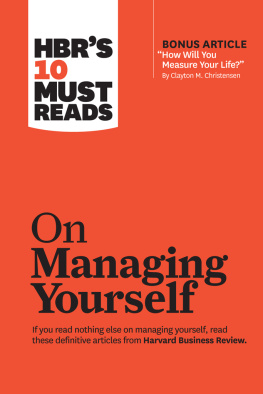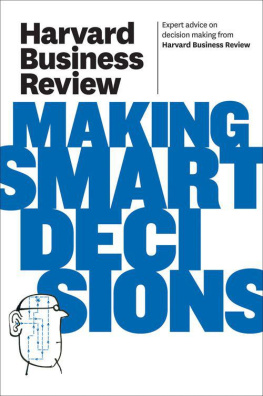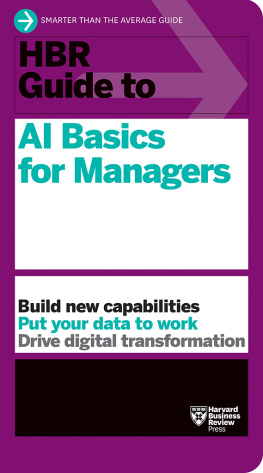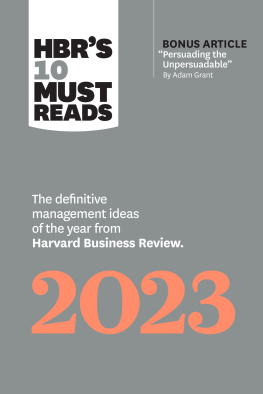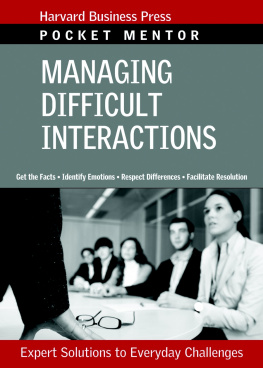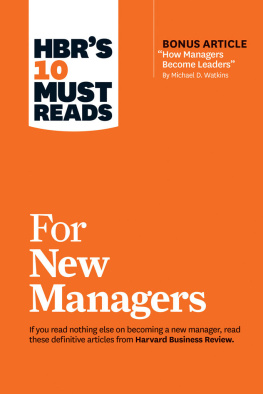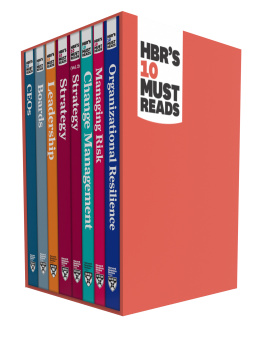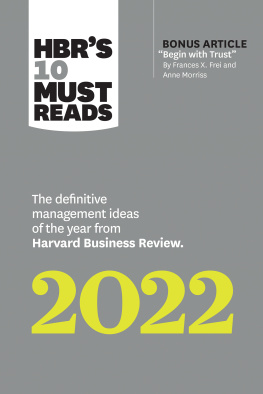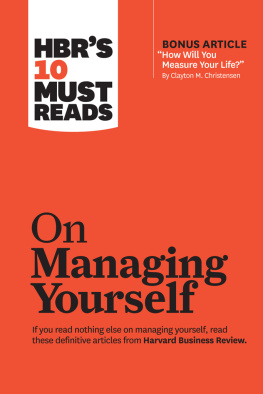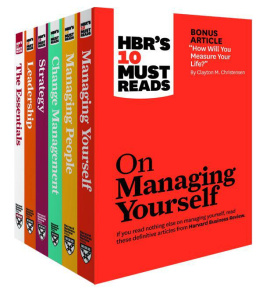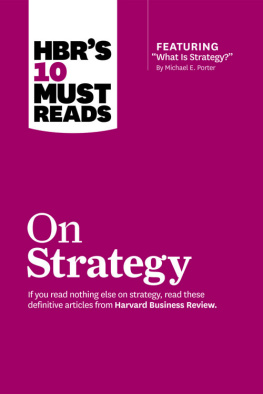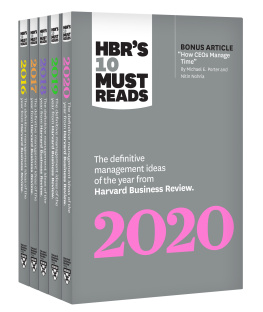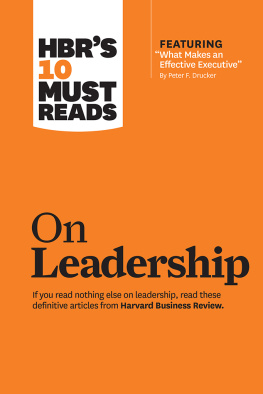Harvard Business Review - The HBRs 10 Must Reads Leaders Collection (3 Books)
Here you can read online Harvard Business Review - The HBRs 10 Must Reads Leaders Collection (3 Books) full text of the book (entire story) in english for free. Download pdf and epub, get meaning, cover and reviews about this ebook. year: 2011, publisher: Harvard Business Review Press, genre: Business. Description of the work, (preface) as well as reviews are available. Best literature library LitArk.com created for fans of good reading and offers a wide selection of genres:
Romance novel
Science fiction
Adventure
Detective
Science
History
Home and family
Prose
Art
Politics
Computer
Non-fiction
Religion
Business
Children
Humor
Choose a favorite category and find really read worthwhile books. Enjoy immersion in the world of imagination, feel the emotions of the characters or learn something new for yourself, make an fascinating discovery.
- Book:The HBRs 10 Must Reads Leaders Collection (3 Books)
- Author:
- Publisher:Harvard Business Review Press
- Genre:
- Year:2011
- Rating:5 / 5
- Favourites:Add to favourites
- Your mark:
- 100
- 1
- 2
- 3
- 4
- 5
The HBRs 10 Must Reads Leaders Collection (3 Books): summary, description and annotation
We offer to read an annotation, description, summary or preface (depends on what the author of the book "The HBRs 10 Must Reads Leaders Collection (3 Books)" wrote himself). If you haven't found the necessary information about the book — write in the comments, we will try to find it.
Harvard Business Review: author's other books
Who wrote The HBRs 10 Must Reads Leaders Collection (3 Books)? Find out the surname, the name of the author of the book and a list of all author's works by series.
The HBRs 10 Must Reads Leaders Collection (3 Books) — read online for free the complete book (whole text) full work
Below is the text of the book, divided by pages. System saving the place of the last page read, allows you to conveniently read the book "The HBRs 10 Must Reads Leaders Collection (3 Books)" online for free, without having to search again every time where you left off. Put a bookmark, and you can go to the page where you finished reading at any time.
Font size:
Interval:
Bookmark:

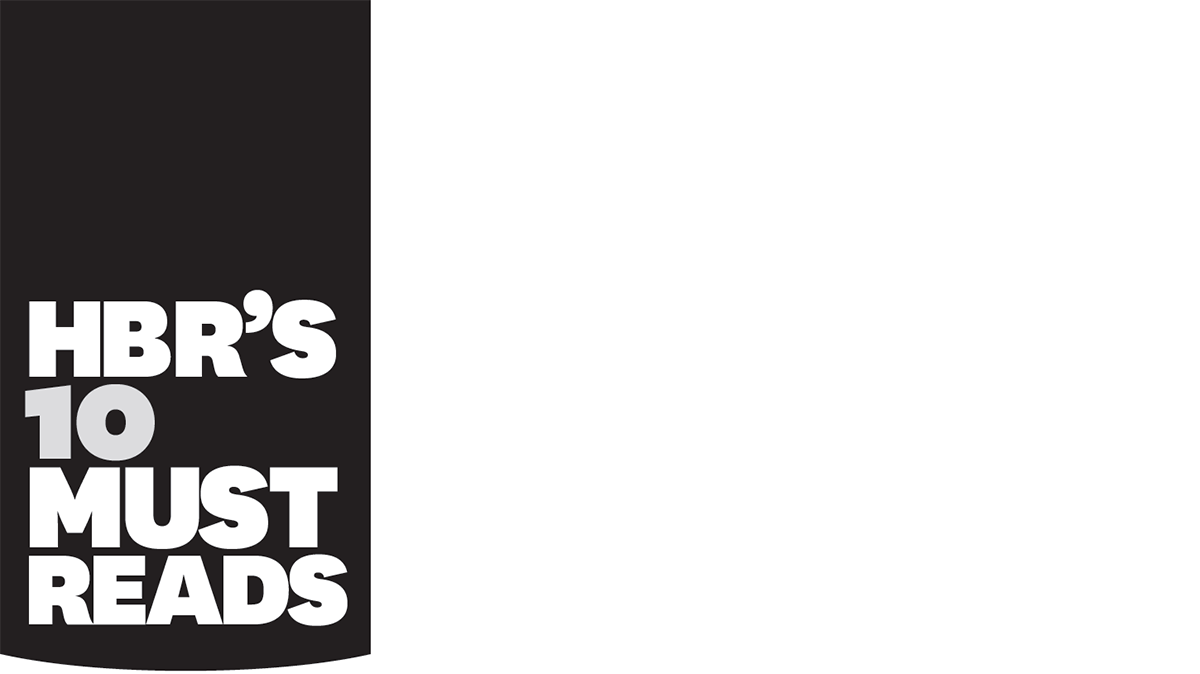
On
Leadership
HARVARD BUSINESS REVIEW PRESS
Boston, Massachusetts
Find more digital content or join the discussion on www.hbr.org.
The web addresses referenced and linked in this book were live and correct at the time of the books publication but may be subject to change.
Copyright 2011 Harvard Business School Publishing Corporation
All rights reserved
No part of this publication may be reproduced, stored in or introduced into a retrieval system, or transmitted, in any form, or by any means (electronic, mechanical, photocopying, recording, or otherwise), without the prior permission of the publisher. Requests for permission should be directed to , or mailed to Permissions, Harvard Business School Publishing, 60 Harvard Way, Boston, Massachusetts 02163.
Library of Congress Cataloging-in-Publication Data
HBRs 10 must reads on leadership
p. cm.
Includes index.
ISBN 978-1-4221-5797-8 (pbk. : alk. paper) 1. Leadership. I. Harvard business review. II. Title: HBRs ten must reads on leadership. III. Title: Harvard business reviews 10 must reads on leadership.
HD57.7.H3914 2010
658.4'092dc22
2010031617
eISBN: 9781422172025
Contents
Daniel Goleman
Peter F. Drucker
John P. Kotter
Ronald A. Heifetz and Donald L. Laurie
Robert Goffee and Gareth Jones
Warren G. Bennis and Robert J. Thomas
Jim Collins
David Rooke and William R. Torbert
Bill George, Peter Sims, Andrew N. McLean, and Diana Mayer
Deborah Ancona, Thomas W. Malone, Wanda J. Orlikowski, and Peter M. Senge
What Makes a Leader?
by Daniel Goleman
EVERY BUSINESSPERSON KNOWS a story about a highly intelligent, highly skilled executive who was promoted into a leadership position only to fail at the job. And they also know a story about someone with solidbut not extraordinaryintellectual abilities and technical skills who was promoted into a similar position and then soared.
Such anecdotes support the widespread belief that identifying individuals with the right stuff to be leaders is more art than science. After all, the personal styles of superb leaders vary: Some leaders are subdued and analytical; others shout their manifestos from the mountaintops. And just as important, different situations call for different types of leadership. Most mergers need a sensitive negotiator at the helm, whereas many turnarounds require a more forceful authority.
I have found, however, that the most effective leaders are alike in one crucial way: They all have a high degree of what has come to be known as emotional intelligence. Its not that IQ and technical skills are irrelevant. They do matter, but mainly as threshold capabilities; that is, they are the entry-level requirements for executive positions. But my research, along with other recent studies, clearly shows that emotional intelligence is the sine qua non of leadership. Without it, a person can have the best training in the world, an incisive, analytical mind, and an endless supply of smart ideas, but he still wont make a great leader.
In the course of the past year, my colleagues and I have focused on how emotional intelligence operates at work. We have examined the relationship between emotional intelligence and effective performance, especially in leaders. And we have observed how emotional intelligence shows itself on the job. How can you tell if someone has high emotional intelligence, for example, and how can you recognize it in yourself? In the following pages, well explore these questions, taking each of the components of emotional intelligenceself-awareness, self-regulation, motivation, empathy, and social skillin turn.
Most large companies today have employed trained psychologists to develop what are known as competency models to aid them in identifying, training, and promoting likely stars in the leadership firmament. The psychologists have also developed such models for lower-level positions. And in recent years, I have analyzed competency models from 188 companies, most of which were large and global and included the likes of Lucent Technologies, British Airways, and Credit Suisse.
In carrying out this work, my objective was to determine which personal capabilities drove outstanding performance within these organizations, and to what degree they did so. I grouped capabilities into three categories: purely technical skills like accounting and business planning; cognitive abilities like analytical reasoning; and competencies demonstrating emotional intelligence, such as the ability to work with others and effectiveness in leading change.
To create some of the competency models, psychologists asked senior managers at the companies to identify the capabilities that typified the organizations most outstanding leaders. To create other models, the psychologists used objective criteria, such as a divisions profitability, to differentiate the star performers at senior levels within their organizations from the average ones. Those individuals were then extensively interviewed and tested, and their capabilities were compared. This process resulted in the creation of lists of ingredients for highly effective leaders. The lists ranged in length from seven to 15 items and included such ingredients as initiative and strategic vision.
Idea in Brief
What distinguishes great leaders from merely good ones? It isnt IQ or technical skills, says Daniel Goleman. Its emotional intelligence: a group of five skills that enable the best leaders to maximize their own and their followers performance. When senior managers at one company had a critical mass of EI capabilities, their divisions outperformed yearly earnings goals by 20%.
The EI skills are:
Self-awarenessknowing ones strengths, weaknesses, drives, values, and impact on others
Self-regulationcontrolling or redirecting disruptive impulses and moods
Motivationrelishing achievement for its own sake
Empathyunderstanding other peoples emotional makeup
Social skillbuilding rapport with others to move them in desired directions
Were each born with certain levels of EI skills. But we can strengthen these abilities through persistence, practice, and feedback from colleagues or coaches.
When I analyzed all this data, I found dramatic results. To be sure, intellect was a driver of outstanding performance. Cognitive skills such as big-picture thinking and long-term vision were particularly important. But when I calculated the ratio of technical skills, IQ, and emotional intelligence as ingredients of excellent performance, emotional intelligence proved to be twice as important as the others for jobs at all levels.
Moreover, my analysis showed that emotional intelligence played an increasingly important role at the highest levels of the company, where differences in technical skills are of negligible importance. In other words, the higher the rank of a person considered to be a star performer, the more emotional intelligence capabilities showed up as the reason for his or her effectiveness. When I compared star performers with average ones in senior leadership positions, nearly % of the difference in their profiles was attributable to emotional intelligence factors rather than cognitive abilities.
Idea in Practice
Understanding EIs Components
Font size:
Interval:
Bookmark:
Similar books «The HBRs 10 Must Reads Leaders Collection (3 Books)»
Look at similar books to The HBRs 10 Must Reads Leaders Collection (3 Books). We have selected literature similar in name and meaning in the hope of providing readers with more options to find new, interesting, not yet read works.
Discussion, reviews of the book The HBRs 10 Must Reads Leaders Collection (3 Books) and just readers' own opinions. Leave your comments, write what you think about the work, its meaning or the main characters. Specify what exactly you liked and what you didn't like, and why you think so.

